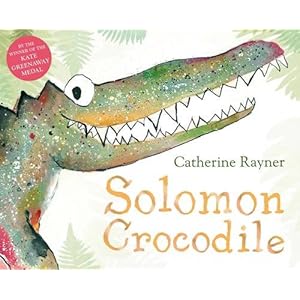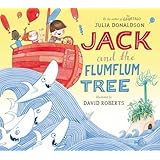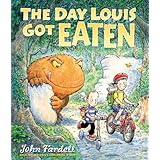It was the end of Scottish Book Week, and here, where we still get free books given to every child every year from birth to five, they dished out three crackers to L and her classmates, whose front covers you can see in this post. I honestly can't tell you which I like best. They're all awesome. If you're looking for a book to give a five year old this Christmas, you won't go wrong with any of these.
But they also gave us Jordan's new Jaiket.
First line: Jordan wis in his bed sleepin. He wis in the middle o a braw dream.
And I have removed it from L and told her she's not allowed to read it.
It's not a Scottish literature thing, obviously. The three fantastic books which illustrate this post are all written by Scottish (or Scottish based) authors and I couldn't be more delighted with them.
But it is a Scots thing.
For a start, I don't happen to think Scots is a language. Now, technically, there's no fixed definition of what's a language, what's an accent and what's a dialect. But if we assume that a dialect is somewhere between a language and an accent, I reckon Scots is a dialect. Or, indeed, a vast number of different dialects which are markedly different if you live in Stornoway, Stranraer or Selkirk. Indeed, people (or indeed folk) from Selkirk, a grand 20 miles away from where I sit, speak a completely different version of Scots from those in Hawick, or Galashiels, or Duns, each of which is less than 20 miles from the others.
 So if L reads, or has read to her (although not by me, because I'd mangle it), Jordan's new Jaiket she's not hearing anything that really resembles the words, accents and turns of phrase she hears out and about.
So if L reads, or has read to her (although not by me, because I'd mangle it), Jordan's new Jaiket she's not hearing anything that really resembles the words, accents and turns of phrase she hears out and about. The introduction to Jordan's new Jaiket, written, obviously, not in Scots, says:
Learning about Scotland helps children to develop a sense of who they are and their place in the world[...]. Exploring Scots language is an iimportant part of this learning.
Of course it is. I couldn't be more delighted for my children, and all other children wherever they are raised, to be given an real sense of the local culture: the literature, art and music, the dialects, architecture and landscape. I want my children to appreciate the works of Robert Burns, John Buchan, James Kelman or Irvine Welsh (but not Walter Scott, because (whisper it) it's incredibly dull).
But not yet. Not now.
L is five. She is just on the cusp of learning to read and write, an explosion of literacy that is going to open up to her worlds of imagining and information. She, and I, are so excited by this. She can't get through her bedtime story at the moment without stopping me to read out words or sentences she has recognised, or to point to a punctuation mark and ask what it is and what it's doing.
 So when she picks up Jordan's new Jaiket, and reads, in her voice which still has more than an echo of three formative years spent in southern England, "Jordan was in his bed sleeping", she is undoing all the hard work her teacher has put in, teaching her to recognise that was is spelt with an a and ing makes the sound, and has the grammatical function, it does (although obviously she wouldn't express it like that), in whatever accent you choose to say it.
So when she picks up Jordan's new Jaiket, and reads, in her voice which still has more than an echo of three formative years spent in southern England, "Jordan was in his bed sleeping", she is undoing all the hard work her teacher has put in, teaching her to recognise that was is spelt with an a and ing makes the sound, and has the grammatical function, it does (although obviously she wouldn't express it like that), in whatever accent you choose to say it.Wherever you stand on the importance (or indeed existence) of the Scots language, at this stage, L, and all the other P1 children who were given this book, are being taught to read and write English, and it is in English that they will go on to read the vast majority of books, textbooks, exam papers, magazines, newspapers or advertisements. Tacitly, the writer and publisher of Jordan's new Jaiket (which is, incidentally, a rubbish story - Jordan can't find his new jacket because his sister has put it on her snowman) know this, else why write the blurb in English?
L's school has a Burns competition. Each year around Burns night, the older children are encouraged to learn a Burns poem and to recite it in front of their classmates and the school. I dearly hope she will take part and I'd love her to be able to do so with a swagger and a swing of Scots conviction. But by that stage she will be older. She will be reading and writing fluently in English, and regularly hearing the local dialect of Scots. She will have the knowledge and sophistication to recognise and understand the differences and to know that what is correct in one is not in the other.
But now, at five, she's not. And to confuse her, or her classmates, is jist wrang.
*With apologies to the shade of Robert Burns.






Hm...
ReplyDeleteCan we still be friends if I disagree with you on this?
Kids are incredibly sophisticated when it comes to learning language. Most of the sentences that come their way aren't complete sentences at all. They're full of hesitations and repetitions. If you see a transcript of the raw material from which they learn, it's very flawed. Hardly a properly constructed sentence in there. Lots of hesitations and repetitions. Yet they learn to speak and write in full sentences.
At 5, I think they are able to understand that one particular book uses language that is a bit different to the language they usually read. I doubt very much that it will confuse them, or only briefly at worst.
Would you not want her to read a book of poetry, or a graphic novel, or a magazine, until she's older and has mastered 'proper' reading? (As you know, I had to swallow hard when 8-yo was given graphic novels as reading books recently.)
Though I'd probably be irritated, if I was in your place, by the fact that 'Jaiket' has an initial capital, but not 'New'. Consistency please!
But the thing is, she didn't. She picked it up and read it by meaning and not by sound. Which in a way proves your point. But when we're still at phonics, word recognition and "sound out what you see" I don't see how "wis" can be of any benefit at all.
DeleteBut yes, I suspect our friendship will survive!
And actually, thinking about this in the post office queue (oh, my life is so exotic), I also think there's a difference between what they hear and what they read.
DeleteAs you say, L is sophisticated enough to filter out the hesitations and repetitions she hears in speech, even when being taught to read and write. However, I still think that to formalise those by writing them down is to confuse.
I think that's where the graphic format is interesting - you've got speech bubbles after all, so the idiosyncracies of the spoken word can be obviously different from what's written at the top of each box by way of description or narrative.
If Jordan's speech were in Scots, it would have been easy to say "this is how he talks, in the same way as I sound a bit different from [insert name of person with different accent here]", but if we're trying to teach her to write "football" then asking her to read "fitbaw" seems unfair.
But I owe Matthew Fitt (the author) at least one apology. I too was irritated by the lack of capital on "new". But I've checked and it turns out I've made that bit up. Jordan's New Jaiket it is...
Hello, I totally agree with you on this. Whilst I am helping my daughter to learn French as well as her native English and understand that a child has a huge capacity to decipher, distinguish and understand different languages - more so than adults - it doesn't seem correct to be asking her to read English - sorry SCOTS! - spelt differently to standard English.
ReplyDeleteI melt at the sound of a Scottish accent and am all for dialects and accents being kept alive, but not at the expense of children being able to read and write their own language correctly.
I was directed to read this post by DorkyMum after my shout out for education related posts for the December BritMums Education Roundup, which is live on Wednesday 12th December. This post will most certainly be included.
That's lovely! Thank you so much!
DeleteI think, too, that French, which is obviously a different language with different vocabulary, grammatical structure and idiom, is in a way easier for a child to differentiate from English (or any other "foreign" language) than Scots where the differences are more subtle and, as I say, can vary depending on where in Scotland the speaker is from.
DeleteIt's as though, instead of just teaching your daughter "French" they were also trying to teach her Provençal...
I agree - it's one of the reasons things like Charlie and Lola irk me slightly. Yes, I understand the language is intended to reflect the spoken word - in this case a child's, but children learn by example.
ReplyDeleteI'm sure L will pick up Scots without having to read it!!
Interesting...
DeleteBecause now you mention it Charlie and Lola don't annoy me (I'm rather fond of them actually) and nor, for that matter does Katie's Coo, which is also (and much more entertainingly) in Scots ("Imagine a coo/ Sittin on the loo") and I think (which reassuringly backs up my conclusion in the post) that that's because I'm reading them (or B is, in Katie's case) and the children aren't.
The annoyance with Jordan is the thought that L and her chums have put in all this effort to learn to recognise words (which is after all how we actually read most of the time) only to have that muddled.
read and write their ain leed richt..... Interesting that. Clearly, this statement depends on who and what you aspire to be and have. Years back, the Norwegians "created" their language which was standardised because it varied so much, to distinguish themselves from the language of thier previously dominant neighbour (which isn't too different from their own). Maybe we should do the same?
ReplyDeleteOnly just spotted this so thank you for the comment and apologies for taking ages to reply.
DeleteReally interesting on the Norwegians though. Maybe that's an idea for Mr Salmond in 2015?